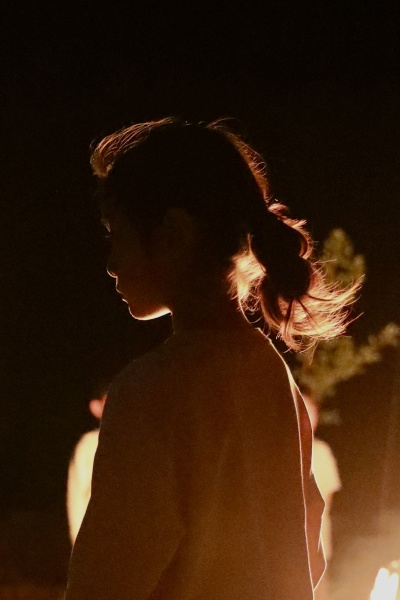Nighttime Sounds
Ni de yan jing bi tai yang ming liang
VERDICT: In wheatfields dotted with 800-year-old stone statues, hidden female desires burn in Zhang Zhongchen’s engrossing magical realist tale from the Chinese hinterlands.
An arty, expressive mix of social realism and the metaphysical, Nighttime Sounds (Ni de yan jing bi tai yang ming liang) is a film about the resilient women of rural China, specifically a young mother and her daughter who survive on their own in a village of farmers while the husband works in a distant factory. Their harsh life is relieved by the mysterious objects and ghostly people so dear to Asian folklore, seamlessly woven into the day-to-day fabric.
This second feature by Chinese filmmaker Zhang Zhongchen comes on the heels of his 2021 debut work The White Cow, which won Best Film and Best Director awards at the First Film Festival in China. Launching Zhang Zhongchen’s career on an international scale is Nighttime Sounds, which bowed in San Sebastian’s New Directors section and looks poised to receive more exposure in festivals. It should particularly interest fans of Asian cinema.
Here atmosphere triumphs over plot and casting is key to connecting the audience to the weak story. In the central role of the psychically gifted, 8-year-old Mao Qing is child star Chen Halin, whose slightly otherworldly face has already graced movies like Nice View and Let Go of my Baby. This admirably plucky little girl lives with her mom Hongmei (actress Li Yanxi), a sullen woman whose secret depths are gradually revealed as the film goes on. These involve her absent husband, a lover who no longer wants her, and a baby girl she has been forced to give to another woman to raise. Li Yanxi burns with passionate combustion in a climactic harvesting scene, where Hongmei’s lover returns and rejects her, humiliating her in front of the entire village.
Qing is also obsessed with her fiery mother and clearly hurt by the attention she devotes to her baby sister when they go together to visit the child. Details of the toddler’s parentage are left vague, allowing Hongmei’s blind maternal instinct to emerge more powerfully as she dotes on the child that is no longer hers to raise.
Qing is a sensitive child able to see more than most people. She seems to remember emerging from the birth canal and she recalls “the things that were taught to her” before she was born. Only she can see a strange child dressed all in white who suddenly appears, following her around the fields like the physical embodiment of her emotional turmoil. The newcomer is looking for its mother and is clearly the ghost of a long dead child. It gives Qing someone to talk to and play with, while she joins the search for the missing mother.
Apart from the ghost child, the village is haunted by the ruined remains of 800-year-old statues dating from the Song dynasty. Surreally, the statues – some headless, some integral – are lined up in two rows facing each other in the wheat fields of Maozhuang Village, where locals still work the land. Abandoned for centuries and forgotten by time, they bring still more mystery to Nighttime Sounds. Chang Reagon’s cinematography makes full expressive use of the film’s unusual setting, the statues suggesting so well the hidden emotions in the women, children and the elderly who have been left behind in this fertile, ancient land when the able-bodied men left to find jobs in the city.
Country-born Zhang Zhongchen was one of these emigrants to the capital. He got interested in film when he did a stint as a security guard at China’s premier Beijing Film Academy, before he broke into the cinema as an editor. He shares editing credit here with Huang Bingjie.
Director: Zhang Zhongchen
Screenwriters: Zhang Zhongchen, Li Zhigang
Producer: Chen Kunyang
Cast: Chen Halin, Li Yanxi, Gu Hanru
Cinematography: Chang Reagon
Editing: Zhang Zhongchen, Huang Bingjie
Music: Chen Retoy
Sound: Clark Zhao, Nancy Chen
Production company: Beijing San Yue Culture Media Co.
World sales: HKIFF Collection
Venue: San Sebastian Intl. Film Festival (New Directors)
In Mandarin Chinese
88 minutes

